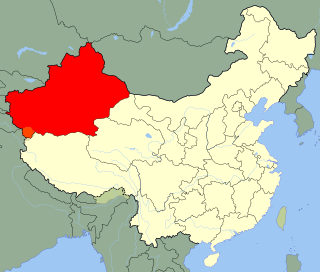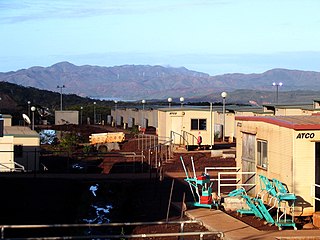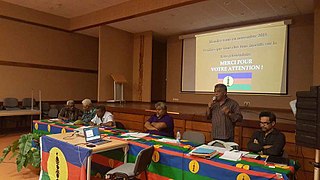| |||||
| Decades: | |||||
|---|---|---|---|---|---|
| See also: | |||||
Events from 2024 in New Caledonia .
| |||||
| Decades: | |||||
|---|---|---|---|---|---|
| See also: | |||||
Events from 2024 in New Caledonia .
Source: [16]

New Caledonia is a group of islands in the southwest Pacific Ocean, 220 km (140 mi) southwest of Vanuatu and 1,210 km (750 mi) east of Australia. Located 16,100 km (10,000 mi) from Metropolitan France, it forms a sui generis collectivity of the French Republic, a legal status unique in overseas France and enshrined in a dedicated chapter of the French Constitution.

New Caledonia is a French sui generis collectivity with a system of government based on parliamentarism and representative democracy. The President of the Government is the head of government, and there is a multi-party system, with Executive power being exercised by the government. Legislative power is vested in both the executive and the Congress of New Caledonia. The judiciary is independent of the executive and the legislature.
The Nouméa Accord of 1998 is a promise by the French Republic to grant increased political power to New Caledonia and its indigenous population, the Kanaks, over a twenty-year transition period. It was signed 5 May 1998 by Lionel Jospin, and approved in a referendum in New Caledonia on 8 November, with 72% voting in favour. Under the accord, three more referendum votes, on whether to remain a special collectivity of France or become an independent state, have been held.

Two flags are in use in New Caledonia, an overseas territory of France. Up to 2010, the only flag used to represent New Caledonia was the flag of France, a tricolour featuring three vertical bands coloured blue, white, and red known to English speakers as the French Tricolour or simply the Tricolour. However, in July 2010, the Congress of New Caledonia voted in favour of a wish to fly the Kanak flag of the independence movement FLNKS alongside the French Tricolour. The wish, legally non-binding, proved controversial. A majority of New Caledonian communes, but not all, now fly both flags, the rest flying only the French Tricolour.

The 2008 Uyghur unrest is a loose name for incidents of communal violence by Uyghur people in Hotan and Qaraqash county of Western China, with incidents in March, April, and August 2008. The protests were spurred by the death in police custody of Mutallip Hajim.

The Tunisian revolution, also called the Jasmine Revolution and Tunisian Revolution of Dignity, was an intensive 28-day campaign of civil resistance. It included a series of street demonstrations which took place in Tunisia, and led to the ousting of longtime dictator Zine El Abidine Ben Ali in January 2011. It eventually led to a thorough democratization of the country and to free and democratic elections, which had led to people believing it was the only successful movement in the Arab Spring.

The 2011–2013 protests in Sudan began in January 2011 as part of the Arab Spring regional protest movement. Unlike in other Arab countries, popular uprisings in Sudan had succeeded in toppling the government prior to the Arab Spring in 1964 and 1985. Demonstrations in Sudan however were less common throughout the summer of 2011, during which South Sudan seceded from Sudan, but resumed in force later that year and again in June 2012, shortly after the government passed its much criticized austerity plan.
Protests began in Syria as early as 26 January 2011, and erupted on 15 March 2011 with a "Day of Rage" protest generally considered to mark the start of a nationwide uprising. The Syrian government's reaction to the protests became violent on 16 March, and deadly on 18 March, when four unarmed protesters were killed in Daraa.
The siege of Daraa occurred within the context of the 2011 Arab Spring protests in Syria, in which Daraa was the center of unrest. On 25 April 2011, the Syrian Army began a ten-day siege of the city, an operation that helped escalate the uprising into an armed rebellion and subsequent civil war.

An independence referendum was held in New Caledonia on 4 November 2018. Voters were given the choice of remaining part of France or becoming an independent country.

Since Emmanuel Macron was elected President of France on 7 May 2017, a series of protests have been conducted by trade union activists, left-wing activists and right-wing activists in opposition to what protesters consider to be neoliberal policies and globalism, his support of state visits by certain world leaders, his positions on French labour law reform, as well as various comments or policy proposals he has made since assuming the presidency.

An independence referendum was held in New Caledonia on 4 October 2020. The poll was the second to be held under the terms of the Nouméa Accord, following a similar referendum in 2018.

Sonia Backès is a French politician in New Caledonia. She is the current leader of the Caledonian Republicans party and the President of the Provincial Assembly of South Province since 17 May 2019.
The COVID-19 pandemic was confirmed to have reached the French overseas collectivity of New Caledonia on 18 March 2020. All cases are on the main island of Grand Terre and are related to travel abroad. On 7 May, all cases had recovered.

The 2020 protests in New Caledonia began on 28 October 2020 over a plan to sell a Vale-owned nickel and cobalt mine to a consortium led by Trafigura. The nickel mine and plant is known as the Goro mine. Independence leaders and pro-independence protesters wanted for the nickel plant to be owned by citizens of New Caledonia rather than foreign investors, though various arrangements have been proposed.
An independence referendum was held in New Caledonia, a French territory in the South Pacific, on 12 December 2021. The vote was the third and final one to be held under the terms of the Nouméa Accord, following votes in 2018 and 2020.

Louis Mapou is a Kanak politician who has served as the President of the Government of New Caledonia since 22 July 2021. Mapou is New Caledonia's first native Kanak president since the position was established in 1999.
Events in the year 2024 in France.
In May 2024, protests and riots broke out in New Caledonia, a sui generis collectivity of overseas France in the Pacific Ocean. The violent protests have led to at least 13 deaths, the declaration of a state of emergency on 16 May, deployment of the French army, and the block of the social network TikTok.